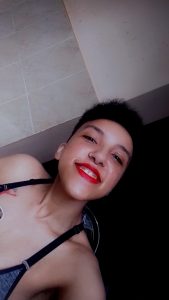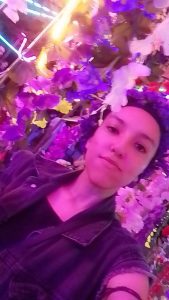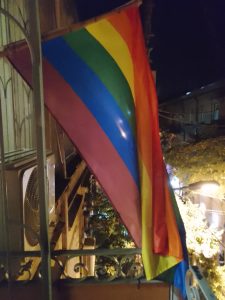With AHA Foundation’s help, Dolly escaped forced marriage in Egypt and claimed her freedom: “I can finally be my authentic self.”

Published 11/3/2023
Born into a conservative Egyptian family in Alexandria, Dolly felt trapped. As a lesbian and a freethinker in a repressive environment, she feared for her life. With the help of AHA Foundation and others, fueled by your support, she eventually escaped to live a life of freedom in the Republic of Georgia in the South Caucasus. This is her story.
AHA Foundation: Thanks for speaking with us today, Dolly. To begin, can you tell us about your background before you left Egypt? What was it like growing up in a traditional atmosphere?
Dolly: I am unsure of where to begin, but during my time living in Egypt, I was under the strict and conservative rule of my single mother. I resided in her family household with her siblings occupying different floors of the same building. This led to my mother constantly feeling the need to prove to them that she had raised a good Muslim girl to meet their societal expectations.
As early as the age of six, she forced me to wear a hijab and would punish me if I did not comply. Besides that, there was domestic violence, abuse, and consistent punishment, for example when I was unable to memorize specific Quranic verses or disobeyed my family.
My uncle and my mom would beat me whenever they had a chance. Especially If I did not meet my mother’s expectations.
At the age of seven, I began attending private Islamic lessons at the mosque where I learned and studied about Sharia, the sunnah, and the Quran. However, as I grew older and delved deeper into Islamic history and Sharia, I learned more about how many interpretations of Islam mistreated women, enslaving and degrading them. From that point on, I knew where all of the abuse came from.
This led me to question my religion, but I was punished for doing so, and my mother forbade me from asking such questions. Despite this, I continued to read about feminism, women’s history, and secularism. This newfound knowledge empowered me to challenge what I believed in and inspired me to challenge the abusive nature of my family and stand up for myself.
I vividly remember discovering that I was a lesbian when I was 14 years old, which led to unbearable punishment from my mother when she found out about my girlfriend.
Finally, at the age of 18, I decided to take off my hijab, which shocked my entire family. They deemed it unacceptable and believed that I had brought shame upon them.
AHA Foundation: Can you tell us about the forced marriage your family tried to subject you to? What inspired you to resist it?
Dolly: Before discussing this topic, I would like to clarify why I was apprehensive about the idea of arranged marriage when my mother suggested it for me.
At the age of 20-21, I had a girlfriend with whom I had a sexual relationship. However, we lost touch as she came from a conservative family as well. Afterward, when my family proposed an arranged marriage, it was more to silence the gossip about their dishonorable infidel and gay daughter (me) than out of care for me.
I vividly remember my mother whispering on the phone with my father’s family about arranging a marriage and relocating me to their farm in the countryside. When I confronted her about it, she admitted to suspecting my reluctance to marry and questioned my behavior. She even threatened to take me to a doctor to check my virginity if I refused to marry. This terrified me as I knew that my family would kill me if they found out that I was not a virgin, and I would become another victim of honor killing.
My mother would constantly remind me of this whenever I expressed my disinterest in marriage. All of this was happening while I was already struggling after being outed.
I did not agree to the arranged marriage. It is difficult for me to describe the situation because, at the time, I was struggling with my mental health due to a traumatic experience of sexual assault and rape that had occurred in Cairo.
The thought of spending the rest of my life with a man who might assault or rape me was unbearable. As a lesbian, I could not imagine being married to a man. This is why I refused to get married.
“I remember the Free Hearts Free Minds therapist crying when I told her what I had been through, and I will always be grateful to her because she was the first person who didn’t blame me for what had happened to me.”
AHA Foundation: How did you ever come to terms with what all that had happened to you?
Dolly: In Egypt, I attended therapy sessions because my mental health was in ruins because of all this. But the therapists I used to see in Egypt were not supportive. They were religious and tried to give me medication to “fix” my homosexuality and convert me back to Islam.
These sessions were not helpful and made me feel even worse and more lonely. One particularly terrible psychiatrist in Cairo even blamed me for being raped, which was a traumatizing experience where I felt responsible for what had happened. I struggled to function on a daily basis and willingly took the medicine prescribed to me because I despised myself and didn’t want to be gay or an atheist because that psychiatrist in Egypt told me it was my fault and it was God’s punishment.
I had frequent nightmares and could barely go about my day. I felt like I was losing myself and numbing my emotions. Eventually, I left Cairo and returned to my home in Alexandria, where I had to deal with my angry family and strangers who harassed me. It was an extremely challenging time for me until I discovered Yasmine Mohammed‘s Free Hearts Free Minds organization online and began therapy sessions with them. I was relieved to find someone who understood and empathized with me, helping me to cope, regain self-confidence, and stop blaming myself for everything that had happened to me. I remember the Free Hearts Free Minds therapist crying when I told her what I had been through, and I will always be grateful to her because she was the first person who didn’t blame me for what had happened to me.
“I [confided in my mother] about my attraction to women, but she responded by burning my hand on the stove and threatening me with circumcision (female genital mutilation) and reminded me of the eternal hellfire that awaited sinners like me.”
AHA Foundation: What was your family’s response to your opposition to the marriage?
Dolly: My family, including my mother, constantly pressured me to get married. However, I was unable to handle the situation, especially after being raped, which I never disclosed to my mother. Despite my attempts to change the subject, my mother insisted that I must prepare myself to become a good housewife for a potential suitor arranged by my father’s family.
When she suspected that my rejection was due to my lack of virginity, she even called upon my uncle to physically beat me.
I remember after a few days of this, during one of our arguments in the kitchen, I tried to convince my mother, by confiding in her about my attraction to women, but she responded by burning my hand on the stove and threatening me with circumcision (female genital mutilation) and reminded me of the eternal hellfire that awaited sinners like me.
AHA Foundation: Did you ever fear for your life?
Dolly: Of course, yes, I was terrified for my life and I was traumatized because the threats and violence I experienced were not only from my own family but also from unknown people. Due to them, my life was shattered, and I lost my sense of security and my job when I was living in Cairo.
I was involved in feminist and liberal activities and events, especially after removing my hijab, but my opinions didn’t sit well with many people. This led to me being labeled as an atheist and an apostate because I chose to remove my hijab. Moreover, when I was in a relationship with my girlfriend, she also faced domestic violence from her family. We tried to escape, but unfortunately, her family caught her, and communication between us was cut off. Some of her former friends betrayed us, exposing our relationship and using it against us.
AHA Foundation: How did you escape the forced marriage, and where did you go?
Dolly: With the assistance of AHA Foundation and others, including Atheist Alliance International, I was able to escape from an arranged marriage, which had left me feeling afraid and without a plan or place to go. I decided to reach out for help, having come across AHA online.
I spoke to Evelyn Markus, Board Member of Free Hearts Free Minds, who informed me that AHA could help by securing the funds for my travel to a safer place and by giving me a small stipend to help me get set up when I arrived there.
With this support, I was able to secure a fellowship in the Republic of Georgia in the South Caucasus.
“Without the AHA funds and assistance… I would not have been able to escape to live a life of liberty.”
I remember telling my mom that I had to travel to Cairo for a job interview and would come back right away and do whatever she wanted. Despite my mother’s resistance, I convinced her that I would be back within a few days. I stayed in a motel and then a hotel while preparing for my visa and travel documentation to Georgia.
Without the AHA funds and assistance, I would not have been able to afford these expenses or obtain the necessary invitation letter for my fellowship. I would not have been able to escape to live a life of liberty.
AHA Foundation: What is your life like now? The country of Georgia also has some conservative elements and repression of LGBTQ rights. Do you feel freer and safer?
Dolly: Despite the challenges faced by the LGBTQ community in Georgia, I have found that it is still much better compared to Egypt. This is because there are safe spaces available for the community to explore and socialize in, as well as cultural and educational events for lesbians and the LGBTQ community. However, the main drawback is that most of these events are conducted in the Georgian language, which may make it difficult for those who have not yet learned the language. Additionally, same-sex marriage is still not legal in Georgia, which means that there are no legal rights for LGBTQ couples, especially in the workplace. Nonetheless, there is still hope for change in the future.
Georgia is imperfect, and I have had negative experiences from Islamist-run companies when applying for jobs. Thankfully, I now have a job at a company that respects freedom of belief. I think there should be laws to prevent companies forcing religion on employees, because Islamists use this power to push their agenda constantly.
Overall, despite the difficulties I’ve faced even here in Georgia, I’ve never been as happy and free since I started my life here. I have realized that freedom and safety are a privilege I never had when I was in Egypt. As an Egyptian Ex-Muslim and lesbian woman, I really can’t believe that I’m finally safe, and every day I’m learning new things, meeting new people, and making new friends. I can finally be my authentic self, unlike in Egypt where everything was forbidden.
And I truly believe that one day, there will be a big change for the better in Georgia and across the world because of the amazing and resilient organizations and advocates who are always helping people like me and building awareness.
AHA Foundation: Have you ever heard from your family since you left Egypt?
Dolly: After not hearing back from my family, I recently discovered that a family member found my TikTok account where I shared my experiences. They were angry and used derogatory language towards me, which caused me to feel afraid and recall past traumatic events. I reached out to the United Nations High Commissioner for Refugees office and Georgian officials to inform them about the situation.
They assured me that my family could not force me to return and instructed me to inform them if my family attempted to contact me. This knowledge made me feel safer and more secure in sharing my story without fear of being harmed. Therefore, I will continue to share my experiences with the world.
AHA Foundation: Do you think we can ever end abuses like forced marriage?
Dolly: I think that you can end violence and forced marriage, but the most important and necessary thing is that the victim who is subjected to abuse or forced marriage must be ready and willing to help herself as well. It is crucial for the victim to be willing and ready to seek help. If the victim desires to lead a life of her own choosing and seeks assistance, then the task of helping her becomes easier.
Other than that, strong laws and institutions play a vital role in stopping abuse and arranged or traditional marriages. Continuous awareness-raising efforts by the state and legal bodies can help victims understand that it is not acceptable for their families to sell them off in marriage.
Unfortunately, many victims believe that their parents have absolute power. It is also important to remember that parents are human beings too, and they may prioritize their personal interests over the well-being of their children.
AHA Foundation: What do you plan to do next in life?
Dolly: At present, I am uncertain about the specific plans I need to make for my future, as my personal matters are not yet fully resolved. However, I have a list of things I want to accomplish once the opportunity arises. The first on my list is to learn the Georgian language so that I can communicate with the locals and attend events that I missed out on.
To aid in my language learning, I want to volunteer with the Tbilisi Pride Organization.
Unfortunately, language is a significant barrier for me in pursuing my desired master’s degree in my preferred field. I also hope to settle down and improve my personal affairs so that I can integrate into society and help LGBTQ refugees.
My goal is to create activities for Arab and Middle Eastern refugees who identify as LGBTQ, where they can learn Georgian for free and participate in activities in their native language or English.
“I want to say to the donors of AHA Foundation who made my journey possible with their generous support: thank you so much for all your help. It means the world to me. You changed my life.”
AHA Foundation: Do you have anything else to add?
Dolly: I want to say to the donors of AHA Foundation who made my journey possible with their generous support: thank you so much for all your help. It means the world to me. You changed my life.
I also want readers to know that they are not alone, even if they are LGBTQ, ex-Muslims, or both, and live in a conservative household or with non-supportive families.
They have every right to live, love, laugh, and not feel any fear because it is their right to feel safe, accepted, and loved, and they should not blame themselves. Love cannot be defeated. 🌈




